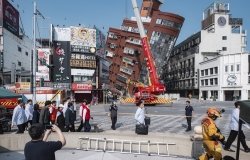Is Hu Jintao a Reformer? Prospects for Liberalization in China
Willy Wo-Lap Lam, senior fellow, the Jamestown Foundation, andformer associate editor, South China Morning Post
Overview
Cosponsored by the Wilson Center's Asia Program and by the Jamestown Foundation
Willie Lam promptly answered the question in this event title in the negative. He stated that China's president Hu Jintao is basically a party apparatchik, having spent most of his career with the Communist Youth League. Hu's primary goal is to continue the one-party rule of the Chinese Communist Party (CCP). Therefore, the prospect for true political liberalization under Hu's leadership is minimal.
Like most party apparatchiks, Hu is skilled in ideology and political organization. He recently approved a new Marxist academy at the Chinese Academy of Social Sciences, and has overseen the publication of 100 new books on Marxism, all dealing with modernizing Marxism for China in the 21st century.
Hu was designated by Deng Xiaoping to be Jiang Zemin's successor in 1992, but did not succeed Jiang as general secretary of the CCP until 2002. "Jiang didn't much like him," said Lam, and in the ten years from 1992-2002, Hu was head of the party central school. He used his time wisely, noted Lam. Hu made a study of all the communist parties around the world, and other parties which had maintained power for many years, such as the LDP in Japan, to seek clues as to how to maintain one-party rule. His conclusion, and an important one, was that democracy is not a prerequisite to maintain political power.
Lam noted it was important to understand that after the fall of the Soviet Union and the Eastern communist bloc in the early 1990s, Deng Xiaoping had a series of political meetings to discuss "lessons learned." He said that first the CCP had to be successful in economic development. If people's lives were to keep improving, the chances of mass demonstrations leading to the overthrow of the CCP would be small. Deng even devised a formula for this, commonly referred to as the "7% solution." The economy had to maintain a 7% growth rate in order for the party to survive. In practical terms, this meant creating 25 million new jobs per year.
The second lesson learned, according to Deng, was that the Soviet communist party had become divorced from business, and was also unable to maintain a firm grip on the army. Therefore, the CCP had to devise means to integrate entrepreneurs into the party, and also had to maintain a firm grip on the People's Liberation Army (PLA). Lam stated that both Jiang Zemin and Hu Jintao have followed this advice closely.
Lam clarified that when Hu talks about political reform, he really means administrative reform. On the other hand, Hu is encouraging the growth of NGOs and civil society in certain areas that do not challenge party authority.
Overall, Lam said, Hu, along with his premier, Wen Jiabao, have been able to keep most Chinese happy, despite functioning within a Leninist party structure. They have co-opted the "red entrepreneurs" and the returned students from abroad, who number over 200,000. Both Hu and Wen have lived and worked in western China, in some of the poorer provinces, and therefore are sensitive to the problems created by growing prosperity being mainly concentrated in China's eastern provinces. They also are trying to achieve a better balance between economic growth and the provision of social services, such as health care and education, and are trying to address China's severe environmental problems. These problems remain, however, perhaps nowhere more so than in the countryside, and protests are increasing.
In response to a question about prevailing corruption, Lam said that the Hu/Wen team are doing a better job than their predecessor, Jiang Zemin. They have managed to lock up one high-level cadre for corruption per month. However, noted Lam, it is basically an impossible task for the CCP to investigate itself; thus the problem of corruption will continue. In response to a question about the viability of Hu's regime, Lam responded that he believes that Hu and Wen can muddle through until 2012, when it will be time for this "Fourth Generation" of leadership to step down. Hu, advised Lam, needs to name a successor early on, but if that successor has a similar background to Hu, that is, a party apparatchik insensitive to real political reform, then Lam predicts trouble for the "Fifth Generation" of Chinese leadership.
Drafted by Mark Mohr, Asia Program Associate
Robert M. Hathaway, Director, Asia Program. Ph: (202) 691-4020
Hosted By

Indo-Pacific Program
The Indo-Pacific Program promotes policy debate and intellectual discussions on US interests in the Asia-Pacific as well as political, economic, security, and social issues relating to the world’s most populous and economically dynamic region. Read more
Thank you for your interest in this event. Please send any feedback or questions to our Events staff.










